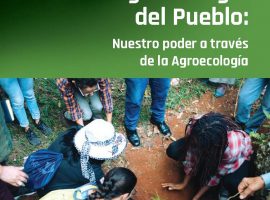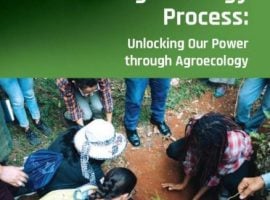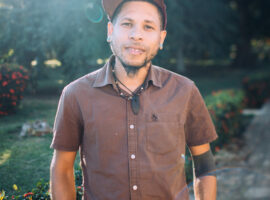For most farmers, farming is generally seen as a means to grow food to nourish their families as well as support populations across the globe. For some, farming can be seen as a means of defining sovereignty and sustainability for one’s self or community, working as a mechanism of social justice. For others, the act of farming goes even further, as an exploration of understanding one’s ancestral roots, one’s generational story, throughout history.
For Owen Taylor of Truelove Seeds and Chris Bolden-Newsome of Sankofa Farm at Bartram’s Garden in Philadelphia, the seeds kept and the food grown on their farms tell those stories and examine the history embedded in the roots reaching deep into the soil they nurture on their respective farms.
Taylor and Bolden-Newsome have been married for 7 years and found a bond in the power of reconnecting with self and history through the soil, as well as the important role food and social justice, along with faith, play in that journey of cultural identity. This found commonality ultimately led to the fruition of Truelove Seeds as a farm and seed company, founded by Taylor in 2017. Bolden-Newsome and Ty Holmberg founded Sankofa Community Farm at Bartram’s Garden in 2011, and have been co-directing the farm for 8 years. Truelove Seeds works with over 25 small-scale urban and rural farms – Sankofa being one of them – where the seeds offered by the company are grown.
Through mentoring, apprenticeship, community gatherings, hands on teaching, cultivation and empowerment, Truelove Seeds offers rare and open pollinated (or naturally pollinated) culturally rich herbs, vegetables and flower seeds in efforts to create a space not only for community food sovereignty to manifest but for cultural preservation, confidence, sustainable agriculture, and human dignity to thrive. At Truelove Seeds’ Mill Hollow Farm, Taylor, for one, connects to his ancestors from southern Italy and Ireland by growing crops from seeds native to those places. Sankofa Community Farm provides a space for African Diaspora focused, spiritual healing of the damaged relationship with the land, food and culture as a means to engage youth, elders and West African immigrants who’ve made Southwest Philadelphia their home (“Sankofa” expressed in the Akan language as “se wo were fi na wosan kofa a yenkyi” or “It is not taboo to go back and fetch what you forgot.”)
I had the opportunity to chat with Taylor and Bolden-Newsome to get more of their authentic thoughts on their collective and individual experiences as urban farmers.
Could you tell us a little about yourself as far as the path, which led you to farming, the work you do and how it impacts the communities that you serve?
Owen: For me, it was growing a garden as a kid. It was just a hobby for me, a vegetable garden. But I worked on a farm as a young person and I fell in love with it, in the mountains of Virginia. When I moved to the Bay Area, I had already been kind of radicalized around political movement stuff and protests and marches and organizing, and that’s when I first came in contact with the food justice movement. For me, it had always been about two separate things: growing food and social justice. I found this community of people that were addressing social justice issues particularly as they relate to the environment, to the food we eat and the land that we live and farm on; having healthy food and healthy land in poor communities and communities of Color in particular that I was living in at that time and continued to live in.
I started looking at the study of urban planning, looking into ‘how do we actually plan for food?’ and ‘what does food justice look like in urban communities?” Then, I worked for Just Food for seven years in New York City. The big part of that work was leadership development, focusing on who are the folks in New York City who’ve been doing this work for decades. ‘How do we honor and invest in the people that came before us, the people who were leading this movement from the ground?’
When I moved to Philly, I started managing a private seed collection for four years and I was like “This is the root of food sovereignty – the seeds, and the stories behind the seeds and how these seeds got here, how they traveled here with people who are still holding on to them as an act of resistance and resilience.” And so I decided to start Truelove Seeds, continuing on my path towards food sovereignty through connecting all the farmers I’ve been working with for a couple of decades back to the seed. ‘How do we become seed stewards or how do we remain seed stewards despite all of the forces against that?’
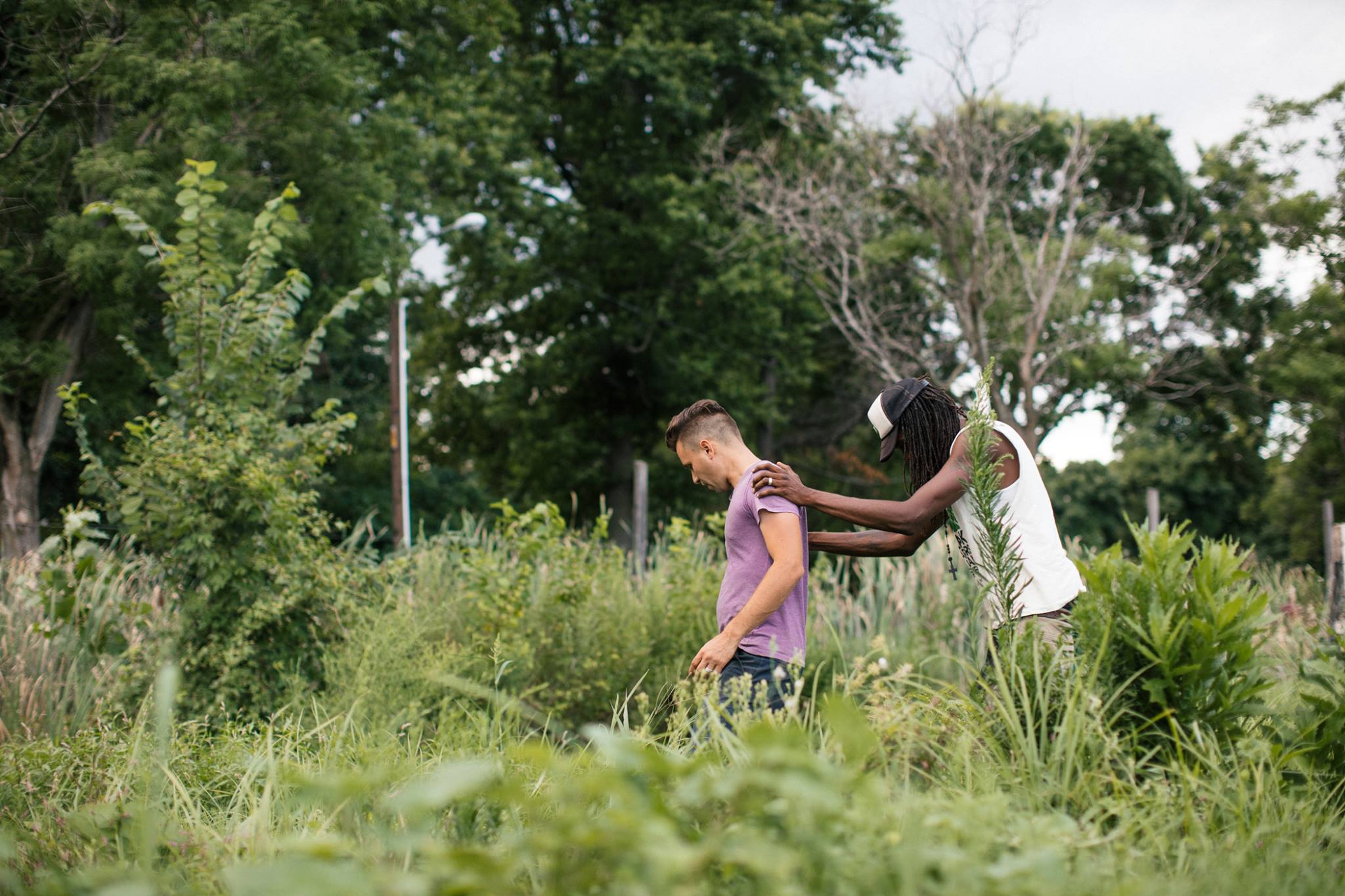
Chris: My family continues to grow food. I’m from Mississippi and probably the fourth maybe fifth generation of free farmers in my family. Where I’m from, most people still grow some of their own food, or they did, when I was little in the Mississippi Delta. When I grew up, my grandmothers continued to grow food. They were just literally off the plantation. My father was born in the same area, essentially on the land where they had been enslaved, so they grew up very poor. But growing food was always the one thing that kept them with a real sense of humanity and a sense of dignity. I think it was the idea of growing food in Black communities. I do it from a cultural motivation and really for the preservation of Black people.
I took it for granted, so when I moved to the north, I moved to D.C., pretty much as soon as I could I set up a garden, and not thinking about it and getting the response from other Black people who would move from the south and the Midwest of shame that I would [set up a garden] in the city. So I had to go through that and it’s not something that has this mystical cachet or is exciting for a lot of African American people and probably, honestly, most Black people in the city. I think that is the case for lots of really valid reasons around people’s trauma, around the land where this ongoing crime against our humanity had taken place and really continues to take place on a worldwide scale. I think it’s easy for us to forget here, so finding the justice thread, for me, was a different route; coming here and noticing the depth of the loss in terms of culture and survival tools amongst my people in the North was astounding to me. Also, it’s the importance of maintaining a Black institution by Back folks for Black folks. So, to me, just growing the food was a way for me to stay connected to what I understood about my Blackness and to be able to offer those tools back to my people who are here, if they want.
“This is the root of food sovereignty – the seeds, and the stories behind the seeds and how these seeds got here, how they traveled here with people who are still holding on to them as an act of resistance and resilience.”
What do you find to be some of the challenges and triumphs you face in doing this work?
Owen: I think my challenges are also chosen challenges; they’re where I decided to focus so they’re also the strengths. So one is people have lost the art of seed saving. And that used to be a core element of farming and gardening. Everybody had to save seeds, seed companies are pretty new, in the last 100 or 150 years. What I could do is go out and find experienced seed growers around the country. That’s what every other seed company does, is find trained seed growers. What I’d rather do is mentor food justice projects to save seeds because when we talk about food sovereignty, it’s always about healthy food, accessible food, but also the culturally appropriate food. If we’re not saving our own seeds we’re letting other people decide what we eat or we’re relying on other people to save the seeds that are important to us.
Many of the communities focused on justice and food sovereignty are displaced peoples, immigrants, refugees, people who were stolen to this land, and indigenous people; I also focus on my own story. The main focus of Truelove Seeds is that we all grow our ancestral seeds. For me, that’s Italian and Irish, mostly. But my family didn’t pass down its food ways, as a process of becoming white in America; intentionally losing our ethnic roots as part of the project of whiteness. So it’s a big challenge to be like “Ok, who are my people and what did they grow and what was important to them as farmers on the land?” That’s been true for a lot of Black folks, that’s been true for a lot of white folks, that’s been true for people whose families have been here for a while who have left the farm and garden behind hoping for success through assimilation. So, since the core piece of Truelove Seeds is the seeds need a story and the story needs to be yours, it’s been a challenge and the most awesome piece of what we’re doing; rediscovering those stories and reconnecting with those stories.
Another challenge is I’ve been in nonprofits for 15 years doing food justice work as my career and I decided intentionally to start a business and try to step out of the nonprofit industrial complex and just see what does food justice look like when you’re oriented towards the communities that you’re working with versus towards funders? So if we’re producing seeds that are culturally meaningful and culturally important to various communities focused on food justice, then they’re the ones funding the work that we’re doing by buying the seeds.
And then [there’s] the loss of land. I don’t have a lease. I don’t own any land. I’m on borrowed property; it doesn’t look like I can stay there forever. That’s something the people from the communities that we work with are always dealing with, whether in the city or in the country, is land ownership or land tenure. So we see people here in the city who’ve been tending lots since the 70’s, 80’s, 90’s who are losing it to development, to gentrification, and then just the struggles around finding land outside of the city where land prices are so expensive.
I think the biggest successes are when people reconnect to their foods in a really meaningful way. I did a class with a Syrian refugee who hadn’t been home in 10 years and one of his main foods is jute (aka molokhia). He’s been using it dried and fresh and I was able to bring him an armload from our farm and he just buried his head in it for like the longest time and was like “I haven’t seen this in ten years.” So now all these Palestinians are coming to my farm to harvest it and people are finding stuff in our seed catalogue from all corners of the country and all corners of the world. For some of our varieties, there is no other company selling them on this continent: Bambara from West Africa or Callaloo from Jamaica or Huacatay from Peru. And so mostly it’s people who already know and love those crops that are producing that seed and then they’re able to provide that to people who are missing that taste of home.
That’s the most rewarding piece of what we’re able to do, as well as the apprenticeship. I have people working as apprentices who are learning all of this and that’s one of my favorite parts, too. They’re growing and they pick out what seeds they want to grow on our farm that are connected to their story.
“Growing the food was a way for me to stay connected to what I understood about my Blackness and to be able to offer those tools back to my people who are here.”
Chris: I work almost exclusively in Black communities. And so in some of the challenges that are there I think, and in some ways have prepared for, mostly it’s [the] people. It’s not that they are challenged, it’s just that there’s a whole history and a whole story that’s never been documented, not even often spoken of. We as Black folk will have a whole lot of information that is just sort of taken for granted. In that whole handing on of knowledge is an intrinsic sort of distrust of the land and things associated with it, so one of the biggest challenges is how to get my people to recognize the power of growing their own food and of taking care of themselves.
We don’t limit it to just the food. I think that’s another thing that has been off putting to me about the food justice movement is this idea of access and this idea to just make sure the poor people have real food available then they’ll eat it and everyone will be happy. We know that’s not true. So one of the biggest challenges is trying to just get the food into the community and to reacquaint us with our own food ways. That’s another thing. Black people in the North – and I’m speaking from our perspective, we live in southwest Philadelphia, one of hungriest zip codes in the northeast – it’s folks having an understanding that this is for you, this is good.
For instance, in Philadelphia, I grow food right next to the largest public housing campus in the county. If you’ve ever been in the projects or lived in the projects, I did when I was younger, they make the kitchens very small, they de-emphasize the role of a kitchen. So, even architecture has served to help distance people from that and create a dependency on systems.
So we don’t just grow food and say “here, y’all. We made it real cheap and you can come and get it.” But there are things that go with that. You’ve got to share the recipe. You’ve got to know the songs that we sing. We’re planting. We pray over our seeds and over our food and have our elders to come and bless it and bless our tools and all of this stuff and it’s good to pull people into the full experience. These things did not happen overnight. So the repair won’t be an overnight experience.
For almost 10 years, we’ve seen a lot [of triumphs]. Our market, by God’s grace, gained a lot. We have two markets, and it’s really kind of contrasting. In the white and affluent market, we count the success by how much money we bring in at the end of the day. But in our market, in the hood, we have to count success by how many and how deep the relationships are that we create to engage with our community. So as a relationship basis, how many households have been impacted, have been touched by this and have returned and what have they produced as a result of that? Are people coming back and telling us, “I made this mustard green last week and I haven’t had mustard greens since my grandmother died”? That’s the tally for us. Ok, then this has been something accomplished here, when people move from being a customer at the market to saying “I want a garden bed in your community garden and I want to grow food with my kids. Can you help me?” You know that’s a success when community gardeners bring other community members and they get it. When people show up on our second Saturday and fourth Saturday workdays from the neighborhood we count it as a success.
I’ve been able to mentor several farmers, young folks. We have a 90 percent rate of kids who leave our program and go into some sort of secondary education. Many of them are into the food system or some other field that is connected to the work that we do. We teach them carpentry – like we go out into the hood and we take names from neighbors who want us to build garden beds in their front yard. That’s what we do. The front yard garden is a testimonial and it’s a source of food, because we recognize our people don’t respond to statistics and numbers, we respond to relationships, to testimony. So we have a waiting list right now in southwest Philadelphia for garden beds.
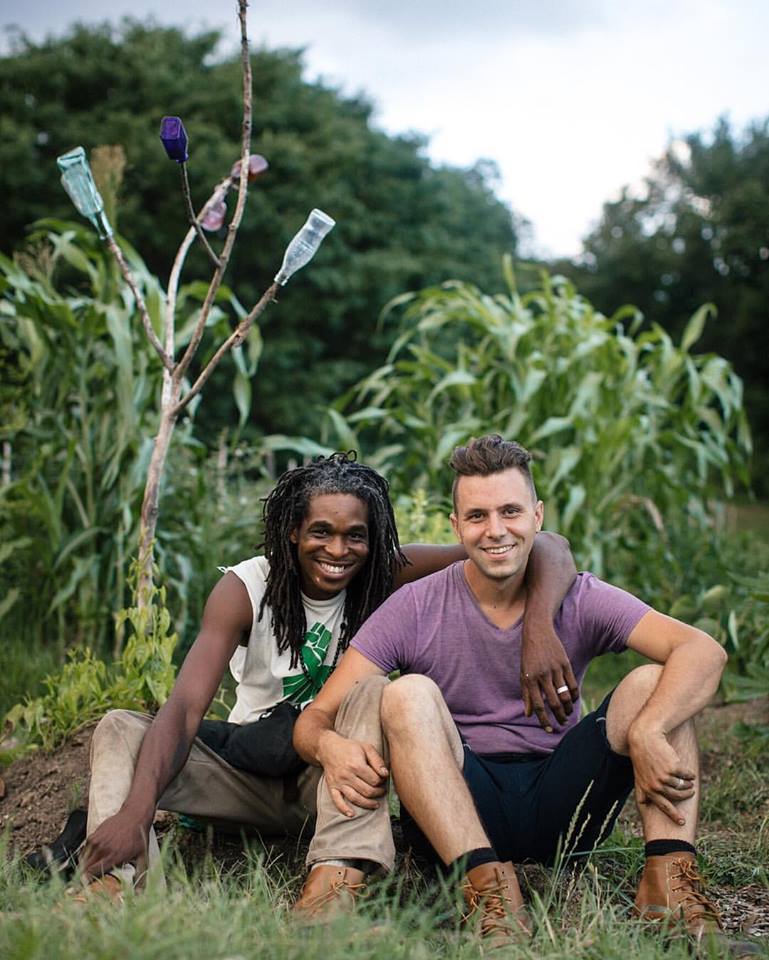
Finish this sentence: “Food sovereignty looks like…”
Owen: People being in control of and stewarding their land, their seeds, their farming systems and the ways that they cook and prepare and access food. There are so many people that have zero control over how they eat and they access food, let alone they use land and farm so to me, food sovereignty looks like having access to land, having access to seed and remembering how to prepare the foods that sustained us for countless generations and how to do so and not going after whatever new food products that are out there but relying on tried and true farming systems that have sustained us for 10,000 years.
Chris: Food sovereignty looks first like people who are firmly rooted in their food, their foodways and their culture. For me, that’s talking about African diasporic people; a community that is rooted in who they are based on who their grandparents told them they are, and who their history has spoken to them about who they are and where they’ve been, and that includes their foodways. Then, it looks like folks confident in their own culture and food ways, then having control of the land and means of production and of all the systems connected to how they eat. And that touches on labor, it touches on community, it has economic implications and also social capital implications – people having the ability to pass along this knowledge. People knowing who they are based on who their people told them they are, not outside forces telling them who they are and what they should eat and what should be available in their neighborhood.




